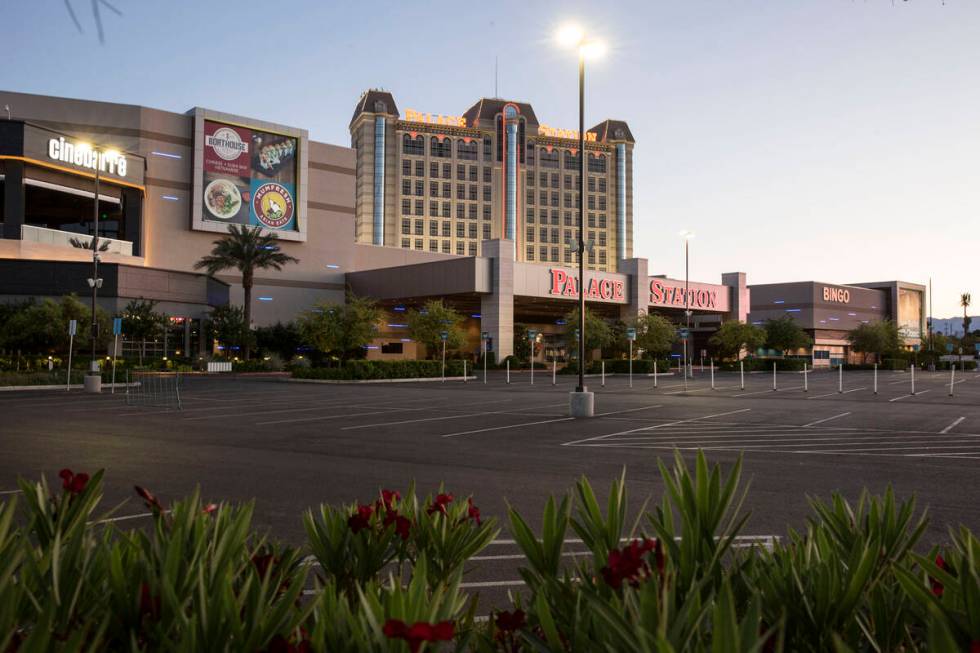Hospitality workers file mass tort lawsuit against Station Casinos

A group of 76 hospitality workers filed a mass tort lawsuit Tuesday morning against one of Nevada’s largest gaming companies over suspected violations of the state’s Right to Return law.
The 55-page lawsuit, filed in a Clark County court, accuses Station Casinos of failing to comply with the law, which requires certain employers to give hospitality workers who lost their job due to the pandemic the chance to return to work. The former and current Station Casinos employees are seeking damages, civil penalties, back pay and reinstatement to positions for which they are qualified.
The Culinary Union, a driving force behind the bill during the 2021 Legislature, hosted a press conference Tuesday morning with many of the employees. The union is throwing its weight behind the workers even though it does not represent them.
“Station Casinos, which fought enactment of the law every step of the way, isn’t following the law,” union Secretary-Treasurer Ted Pappageorge said Tuesday. “They need to do the right thing — their current and former employers demand and deserve justice.”
The Right to Return law, or Senate Bill 386, went into effect July 1, 2021. It enshrined protections for hospitality workers who lost their job due to the pandemic by mandating employers to offer former employees their previous jobs or a similar position if one becomes available.
In a statement, a Station Casinos spokesman called the lawsuit “only the latest in a series of empty publicity stunts by the Culinary Union,” adding that the law itself was a publicity stunt.
The spokesman said “while we are not even sure what a ‘mass action lawsuit’ is in this context, we are certain that it is intended to harass and bully Station Casinos,” later adding that the company is confident it’s complied with the law, “despite it being as misguided, counterproductive, and useless as it has been.”
More than 25 complaints filed
Pappageorge said the union wasn’t aware of potential Right to Return violations at other Nevada gaming properties.
Under the law, workers can submit Right to Return violation complaints to the Nevada Office of the Labor Commissioner or file a lawsuit against the company.
Labor Commissioner Shannon Chambers said there have been more than 25 Right to Return-related complaints filed with her office, none of which have been substantiated. She said the main reason those complaints were closed was that the employee didn’t first contact their employer about a return to work, which the law requires.
Workers named in the Station lawsuit allege the company failed to notify employees before posting job listings or filled those positions for which they were qualified.
Some employees said they never received a response from Station Casinos, according to the complaint. Others said they were passed over for employees with less seniority or were told without explanation that they were not qualified for the open positions.
All 76 workers in the lawsuit said they informed the company of the violation and didn’t get a response within the requisite 15 days.
Samuel Fletes, one of five plaintiffs who spoke at the Culinary press event, said he was a cook’s helper at Sunset Station for nearly eight years before he was laid off in March 2020 due to the pandemic. He alleges the company posted a job listing for a cook’s helper in October 2021 without notifying him. He also contends the company didn’t explain why it thought he was unqualified for the position.
“We did not be loyal workers for this company (just to be) tossed aside like yesterday’s trash,” Fletes said.
‘Ongoing labor dispute’
The 15-day notice required by SB386 was likely intended to prevent litigation from happening, “but apparently, it’s not prevented this litigation,” UNLV labor law professor Ruben Garcia said.
Garcia said the law was primarily intended to help hospitality workers who lacked recall provisions in a collective bargaining agreement, like those at Station Casinos. Culinary, through its support of the law, has tried to create a minimum standard for workers, whether or not they have a contract or union.
And Garcia said the union would be in a good position to know how the law is working.
He noted that “there’s clearly the backdrop of the ongoing labor dispute between the two parties,” a history that spans more than a decade. He said unions often try to find leverage when settling disputes and litigation can be such a lever.
Last week, Culinary called on Nevada gaming regulators to investigate Station Casinos for potential labor law violations and consider penalizing or revoking the company’s gaming licenses.
Employees at multiple Station properties have successfully unionized with Culinary representation, though Station and the union have yet to sign a contract at any of those properties.
The National Labor Relations Board, in a 92-page complaint filed April 2021, accused Red Rock Resorts and its affiliates of using the pandemic to undermine unions representing or looking to represent company employees. The board said the gaming company laid off, fired, rehired and recalled employees, terminated their recall rights and benefits and implemented new health and safety standards without bargaining with unions, doing so “in a selective and discriminatory manner that was calculated to dilute union support among their employees.”
Some employees at Boulder Station and Palace Station in August and September 2020 signed petitions asking to leave their union representation. The federal labor board complaint last spring said those withdrawals were “unlawful” and “based on anti-union petitions that Station Casinos unlawfully encouraged employees to circulate and sign.”
Garcia said he’s curious to see how this new lawsuit will play out — maybe it highlights an aspect of the law that could potentially be addressed in another legislative session.
“The lawsuit itself doesn’t purport to say that every other company is doing just fine,” he said.
Contact Mike Shoro at mshoro@reviewjournal.com. Follow @mike_shoro on Twitter.